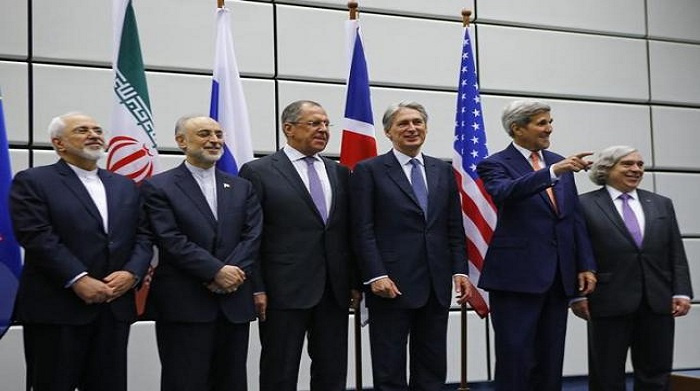Axis of Peace in Syria

International conflicts in the modern era have repeatedly made strange bedfellows of traditional rivals, WWII's allied powers being a salient example. A similar global alliance is called for today because the new enemy is extremism and fascistic violence by the Islamic State and Al-Qaeda and its other affiliate groups that are wreaking havoc throughout the Middle East today. The Syrian theater in particular, where so many have died or fled their country, overwhelming Europe, is ripe to put such an alliance into practice, principally by forming an "axis of peace" consisting of Russia-US-Iran.
The reasons for contemplating this axis are not difficult to surmise. All three are officially committed to fighting the ISIS menace and with prudent diplomacy harvested from the successful Iran talks can gel together in a coherent umbrella strategy that would revolve around (a) defeating the radical extremists, and (b) finding an all-Syrian political solution. Needless to say, this will not be acceptable to the conservative Persian Gulf states such as Saudi Arabia and Qatar, who have been supporting the radical Jihadists fighting Damascus, but even Israel should be in favor of a scenario that would prevent Syria's takeover by those extremists at its doorstep.
Presently, Iran and Russia are fully behind the embattled government of Bashar al-Assad, whose removal until recently was a firm demand of the Western governments. But, with the tsunami of refugees toward Europe, estimated to rise to millions from the current half million or so, countries such as France have revised themselves by openly admitting that requesting Assad's removal as a precondition for the Syria talks is unrealistic. In fact, it is outright foolish, since it is patently obvious that the Syrian government would be doomed without him. In that case, Syria will turn into another Libya, parceled out to different warlords. Yet, with sufficient international cooperation it is possible to turn the tide against the radical Jihadists in Syria, return peace and normalcy to the country and to retrieve its mass refugees.
In this connection, Russian President Vladimir Putin's decision to bolster military assistance to Assad, e.g., by building a new military base and dispatching more military advisers, is a step in the right direction that should not be misconstrued by the West as a sign of Russian aggression, but rather prudent big power action in the face of growing extremism. Since the US is now actively involved in an air campaign against ISIS inside both Syria and Iraq, coordination between the US and Russian military is inevitable and, should it happen, then it is only a matter of time before Iran joins the fray and thus effectuate the new axis of peace.
Needless to say, such a new Syria strategy on Washington's part faces formidable obstacles, including Washington's distrust of Moscow and Tehran, and vice versa. There is a tall wall of mistrust that needs to be removed before the axis of peace in Syria can materialize, requiring earnest negotiations among the three powers, who will undoubtedly consult with other powers, including the Europeans, who are feeling the growing pain of their thoughtless Syria policy that has yielded the mass refugees for them, i.e., a monumental headache that needs to be tacked at the roots inside Syria. Unfortunately, Europe continues with its bandage policy of allocating funds for the refugees without similarly allocating a much-needed Syria policy that aims to bring the bloody conflict to a proper end. But, perhaps with the new waves of Syrian war refugees knocking at their doorsteps, the European leaders are waking to this urgent priority.
With respect to Iran, which has recently unveiled a new Syria peace plan, select cooperation with the US on Syria is possible only when Tehran is guaranteed that the US will (a) remain consistent and can insulate itself from the negative influence of its Arab allies who oppose Assad, and (b) avoid the past policy of sowing regional chaos in order to further its interests. In fact, it is difficult to see what US can achieve by further destabilizing Syria and, in effect, turning it into a terrorist haven that would endanger US homeland? Lest we forget, US invaded Afghanistan because it had given sanctuary to terrorists accused of masterminding the 9/11 attacks, thus setting a precedent that might be repeated in the future in case there is another similar attack on US territory. The prudent dictates of "preemptive diplomacy" raise the necessity of US's participation in a new alliance against ISIS, which has threatened to strike at US and its allies.
Of course, with the successful implementation of the Iran nuclear deal, which has survived the US congressional opposition, the stage is set for a slow deepening of US-Iran interactions beyond the mere nuclear issue, and the logic of "rational choice" in foreign decision-making in Washington and Tehran raise the distinct possibility of select cooperation on issues of mutual interest, such as Iraq, Afghanistan, and Syria. The latter is now a prime candidate for the emergence of an unlikely and hitherto unanticipated alliance against ISIS and Al-Qaeda extremism that would have salutary implications with respect to a thaw in US-Russia and US-Iran relations. The ball is in the US's court and it remains to be seen if the US "smart power" can deliver the hitherto absent "smart Syria policy" that boils down to a new axis of peace.

